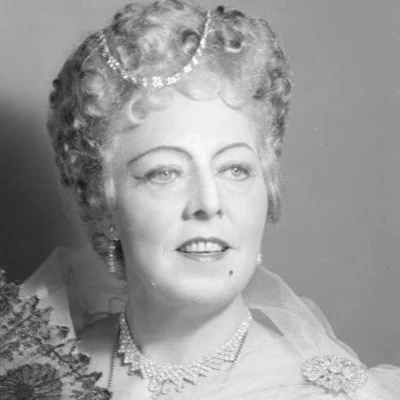| A Requiem "For Those We Love": VIII. Sing On, You Grey-brown Bird |
Paul Hindemith
|
Hindemith: Requiem "For Those We Love" |
| Trauermusik for Viola and String Orchestra: III. Lebhaft. Vivo |
Paul Hindemith
|
Great Czech ConductorsMartin Turnovský |
| Amor and Psyché. Ballet Overture for Orchestra |
Paul Hindemith
|
Hindemith - Legendary Recordings |
| Stabat Mater, P. 77:IV. Quae moerebat et dolebat |
Elisabeth Höngen
|
Pergolesi: Stabat Mater, P. 77 |
| Messa da requiem : Libera me - Dies irae |
Elisabeth Höngen
|
Giuseppe Verdi: Messa da Requiem (München 1950) |
| Rondo |
Paul Hindemith
|
20th Century Sax |
| Das Rheingold. Zweite Szene: Wotan, Gemahl, unsel'ger Mann! |
Elisabeth Höngen
|
Furtwängler - Opera Live, Vol.1 |
| Piano Sonata No. 1 in A Major: III. Andante |
Paul Hindemith
|
Paul Hindemith: Piano Sonata No. 1 in A MajorSerguéi Prokófiev: Piano Sonata No. 1 in A Major |
| Sonata for Alto Saxophone: I. Ruhig bewegt |
Paul Hindemith
|
20th Century Sax |
| Drei Stücke für Violoncello und Klavier, Op. 8 No. 1: Capriccio in A Dur |
Paul Hindemith
|
Paul Hindemiths Work for Cello & PIano |
| Der Rosenkavalier, Op. 59, TrV 227, Act 3: "Ist ein Traum, kann nicht wirklich sein" (Sophie, Octavian) |
Elisabeth Höngen
|
Karl Böhm - The Early Years |
| Zwischenspiel (Carmen) |
Elisabeth Höngen
|
Carmen |
| Das Rheingold. Zweite Szene: Wotan! Gemahl! erwache! |
Elisabeth Höngen
|
Furtwängler - Opera Live, Vol.1 |
| Rhapsody for Alto Saxophone and Orchestra, L. 98 |
Paul Hindemith
|
20th Century Sax |
| Stabat Mater, P. 77:II. Cujus animam gementem |
Elisabeth Höngen
|
Pergolesi: Stabat Mater, P. 77 |
| Sonata for Flute and piano: II. Sehr langsam |
Paul Hindemith
|
German Flute Music |
| Apparebit repentina dies:Ydri fraudes ergo care |
Paul Hindemith
|
GREAT CONDUCTORS (THE) - Paul Hindemith conducts own works (1934, 1950) |
| Acht Stücke: II. Scherzando |
Paul Hindemith
|
Music for Solo Flute |
| Symphony No. 9 in D Minor, Op. 125: IV. Pt. 3. Allegro assai vivace. Alla marcia |
Elisabeth Höngen
|
Beethoven: Symphony No. 9 & Mozart: The Magic Flute Ouverture |
| Piano Sonata No. 1 in A Major: II. Im Zeitmass eines sehr langsamen Marsches |
Paul Hindemith
|
Paul Hindemith: Piano Sonata No. 1 in A MajorSerguéi Prokófiev: Piano Sonata No. 1 in A Major |
| Messa da requiem (Excerpts):VIIc. Requiem aeternam [Live] |
Elisabeth Höngen
|
Schubert, Brahms & Verdi: Vocal Works |
| Stabat Mater, P. 77:IX. Sancta Mater istud agas |
Elisabeth Höngen
|
Pergolesi: Stabat Mater, P. 77 |
| Jephte: I. Dum vocantem |
Elisabeth Höngen
|
Monteverdi: Lamento di Arianna & Sonata sopra Sancta Maria - Carissimi: Jephte |
| Symphony No. 9 in D Minor, Op. 125, "Choral":IV. Poco allegro stringendo il tempo, sempre più allegro |
Elisabeth Höngen
|
BEETHOVEN: Symphony No. 9 (Furtwangler) (1951) |
| Drei leichte Stüke für Violoncello und Klavier: I. Mässing schnell, munter |
Paul Hindemith
|
Paul Hindemiths Work for Cello & PIano |
| Violin Concerto: II. Lento |
Paul Hindemith
|
Paul Hindemith: Violin Concerto - Bohuslav Martinů: Sonata For Violin And Piano No. 3, H 303 |
| Symphonic Metamorphosis after Themes by Carl Maria von Weber:IV. Marsch |
Paul Hindemith
|
HINDEMITH, P.: Theme and Variations, "The 4 Temperaments"Symphonic Metamorphosis (Berlin Philharmonic, Hindemith) (1955) |
| String Trio No. 2: II Lebhaft |
Paul Hindemith
|
Paul Hindemith: Viola Recital |
| Violin Sonata in C Major: III. Fuge - Ruhig bewegt |
Paul Hindemith
|
Sviatoslav Richter 100, Vol. 10 (Live) |
| Carmen, GB 9, IGB 16:"Euren Toast kann ich wohl erwidern (Torerolied)" |
Elisabeth Höngen
|
Great Voices at Dresden Opera Theatre Semperoper |
 A Requiem for those we love: vi. song
A Requiem for those we love: vi. song A Requiem for those we love: vi. song
A Requiem for those we love: vi. song